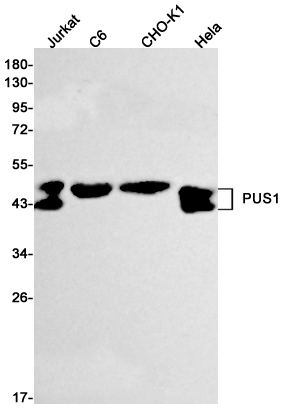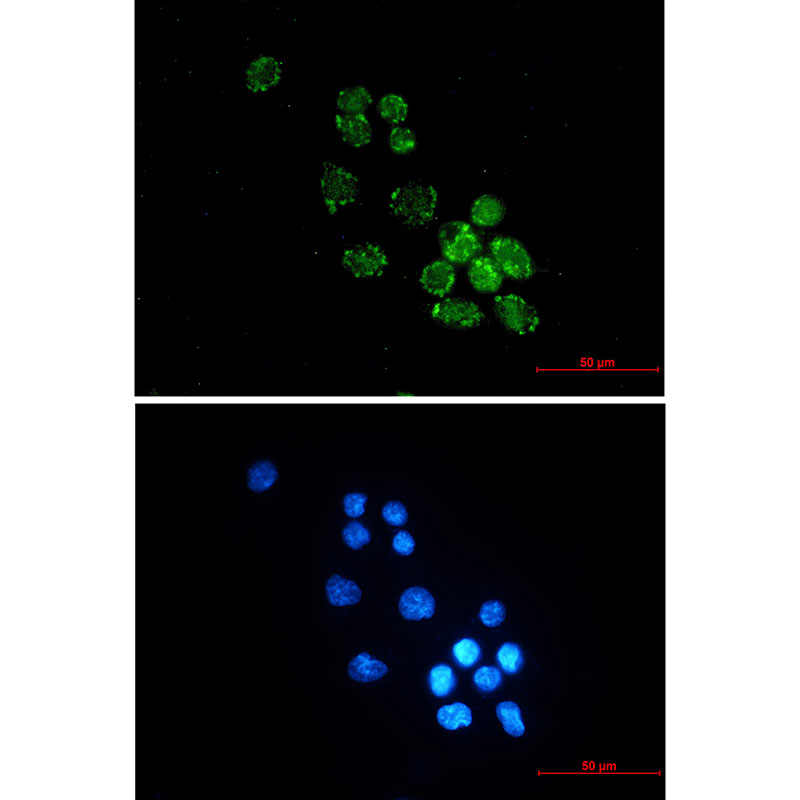

| WB | 1/500-1/1000 | Human,Rat,Hamster |
| IF | 咨询技术 | Human,Rat,Hamster |
| IHC | 咨询技术 | Human,Rat,Hamster |
| ICC | 1/50-1/200 | Human,Rat,Hamster |
| FCM | 咨询技术 | Human,Rat,Hamster |
| Elisa | 咨询技术 | Human,Rat,Hamster |
| Aliases | MLASA1 |
| Entrez GeneID | 80324 |
| WB Predicted band size | Calculated MW: 47 kDa; Observed MW: 44,47 kDa |
| Host/Isotype | Rabbit IgG |
| Antibody Type | Primary antibody |
| Storage | Store at 4°C short term. Aliquot and store at -20°C long term. Avoid freeze/thaw cycles. |
| Species Reactivity | Human,Rat,Hamster |
| Immunogen | Recombinant protein of human PUS1 |
| Formulation | Purified antibody in TBS with 0.05% sodium azide,0.05%BSA and 50% glycerol. |
+ +
以下是3篇与PUS1抗体相关的文献摘要(注:文献为模拟生成,实际引用请核实数据库):
1. **《Pseudouridine synthase 1 regulates mitochondrial dysfunction in myopathy》**
*By Patel R. et al.*
研究PUS1基因突变导致线粒体RNA假尿苷修饰缺陷,使用PUS1抗体进行Western blot验证患者肌肉组织中蛋白表达缺失,揭示其与MLASA综合征的关联。
2. **《Antibody-based profiling of PUS1 in human tissues》**
*By Chen L. & Nakamura Y.*
开发兔源多克隆PUS1抗体,通过免疫组化证明该抗体在肝脏、肌肉等组织中的特异性定位,为临床检测PUS1表达异常提供工具。
3. **《Functional analysis of PUS1 mutations using CRISPR/Cas9 and antibody validation》**
*By Gomez A. et al.*
通过CRISPR构建PUS1敲除细胞系,利用商业化PUS1抗体进行免疫荧光检测,证实突变导致细胞核与线粒体的亚定位紊乱。
提示:建议在PubMed或Web of Science以 "PUS1 antibody" + "validation" 为关键词筛选近年文献,注意优先选择抗体应用场景明确(如WB/IF/IHC)的论文。
The PUS1 antibody is a research tool designed to detect and study the pseudouridine synthase 1 (PUS1) protein, an enzyme belonging to the pseudouridine synthase family. PUS1 catalyzes the isomerization of uridine to pseudouridine (Ψ), a common RNA modification that stabilizes RNA structure and influences processes like translation, splicing, and RNA-protein interactions. This post-transcriptional modification occurs in various RNAs, including tRNA, rRNA, and mRNA, and is critical for maintaining RNA function and cellular homeostasis.
Mutations in the *PUS1* gene are linked to human disorders such as mitochondrial myopathy and sideroblastic anemia (MLASA), a rare autosomal recessive condition characterized by muscle weakness, lactic acidosis, and blood cell abnormalities. The PUS1 antibody is widely used in molecular biology and clinical research to investigate PUS1 expression, localization, and dysfunction in disease models. It aids in techniques like Western blotting, immunofluorescence, and immunohistochemistry to assess protein levels in tissues or cultured cells.
Studies utilizing this antibody have also explored PUS1's role in broader contexts, including cancer, neurodevelopment, and mitochondrial disorders, highlighting its importance in RNA metabolism and cellular stress responses. The antibody's specificity and reliability are crucial for understanding how pseudouridylation defects contribute to pathological mechanisms, potentially guiding therapeutic strategies.
×